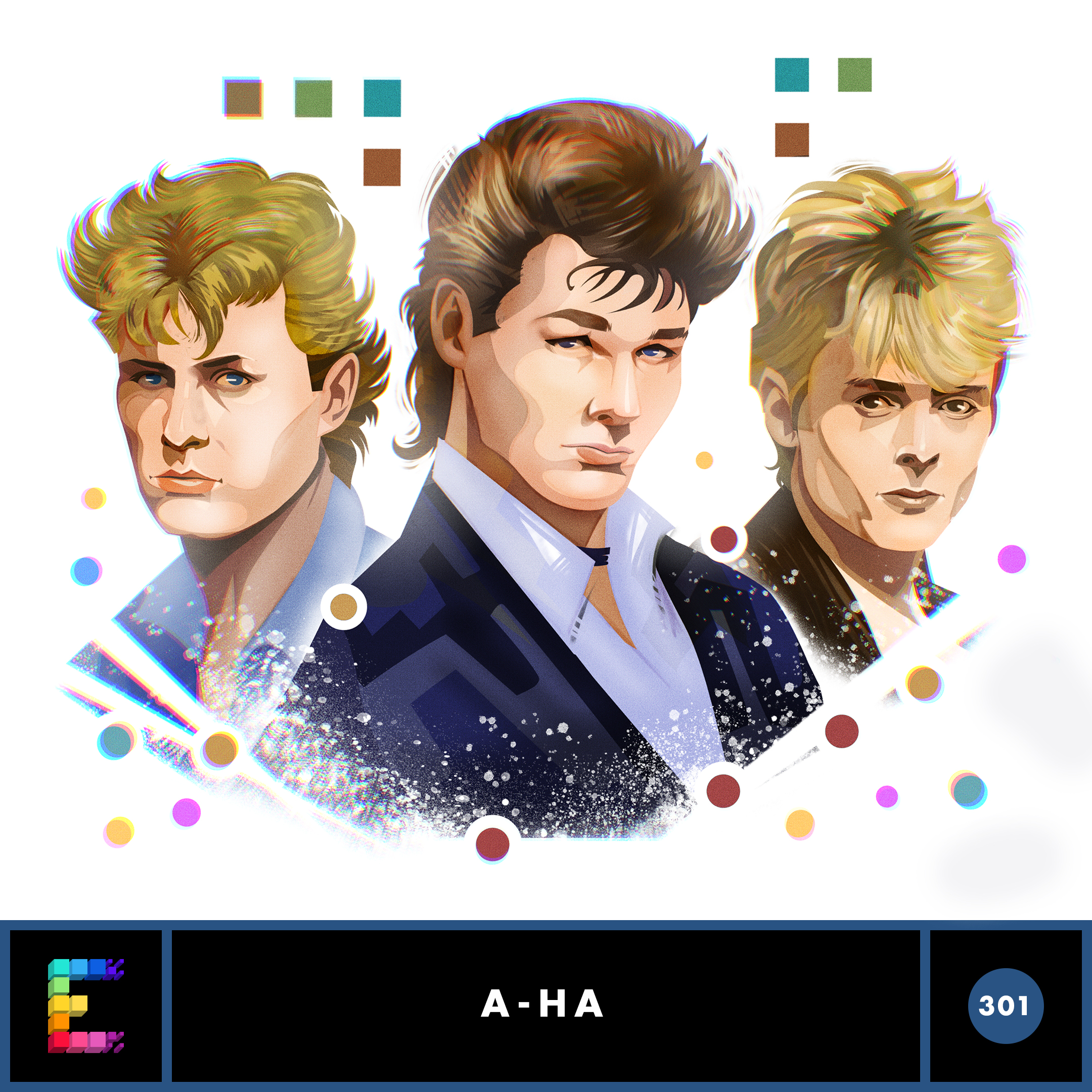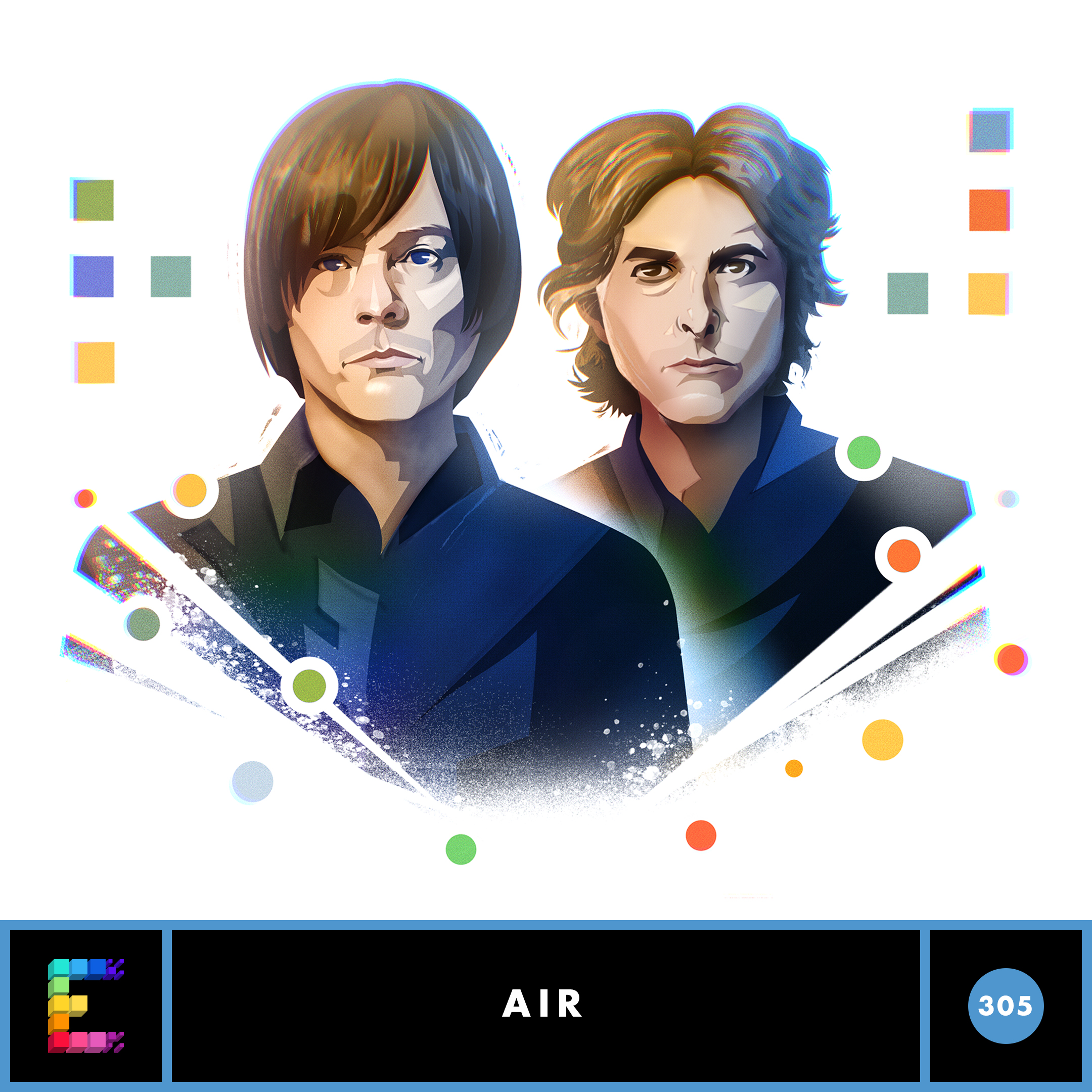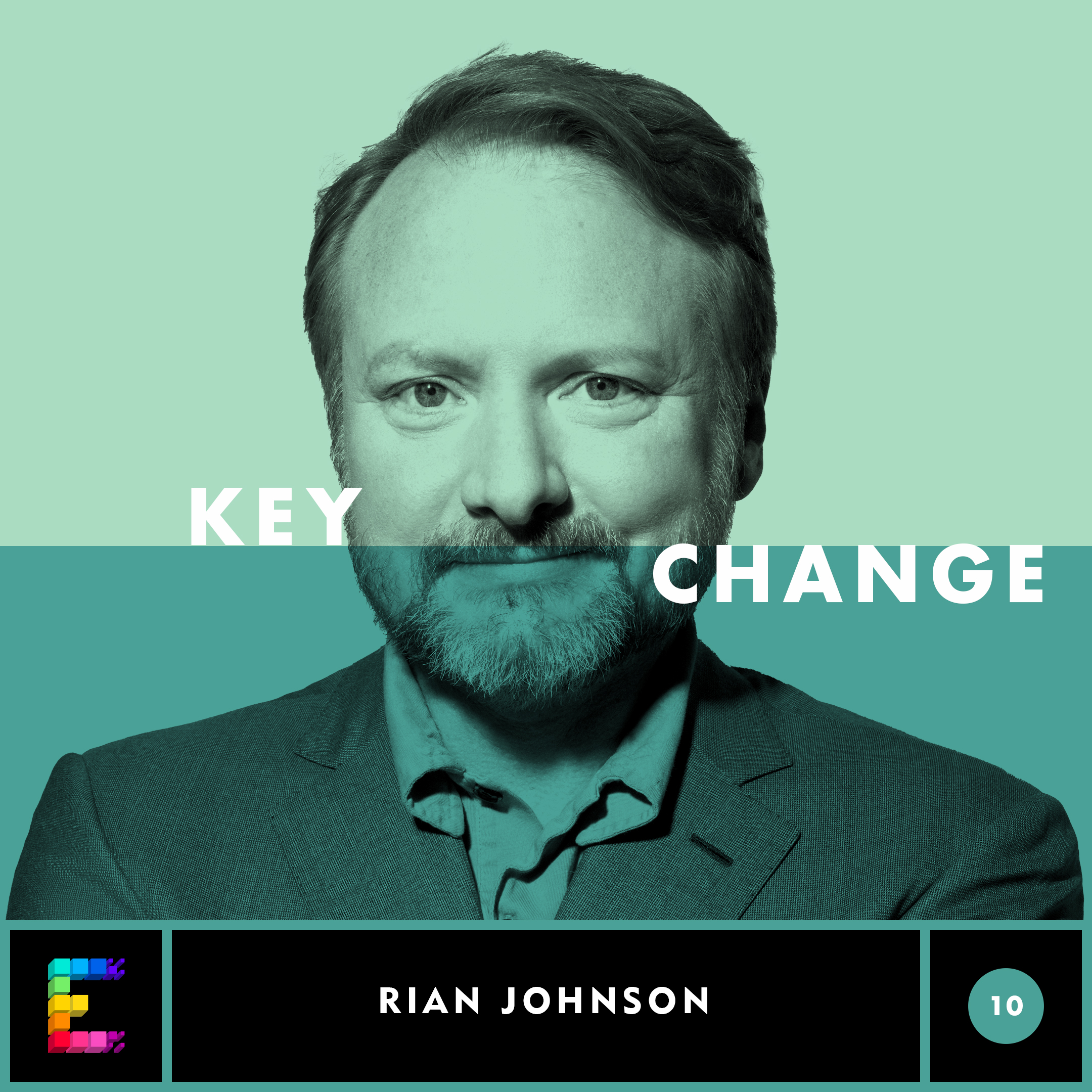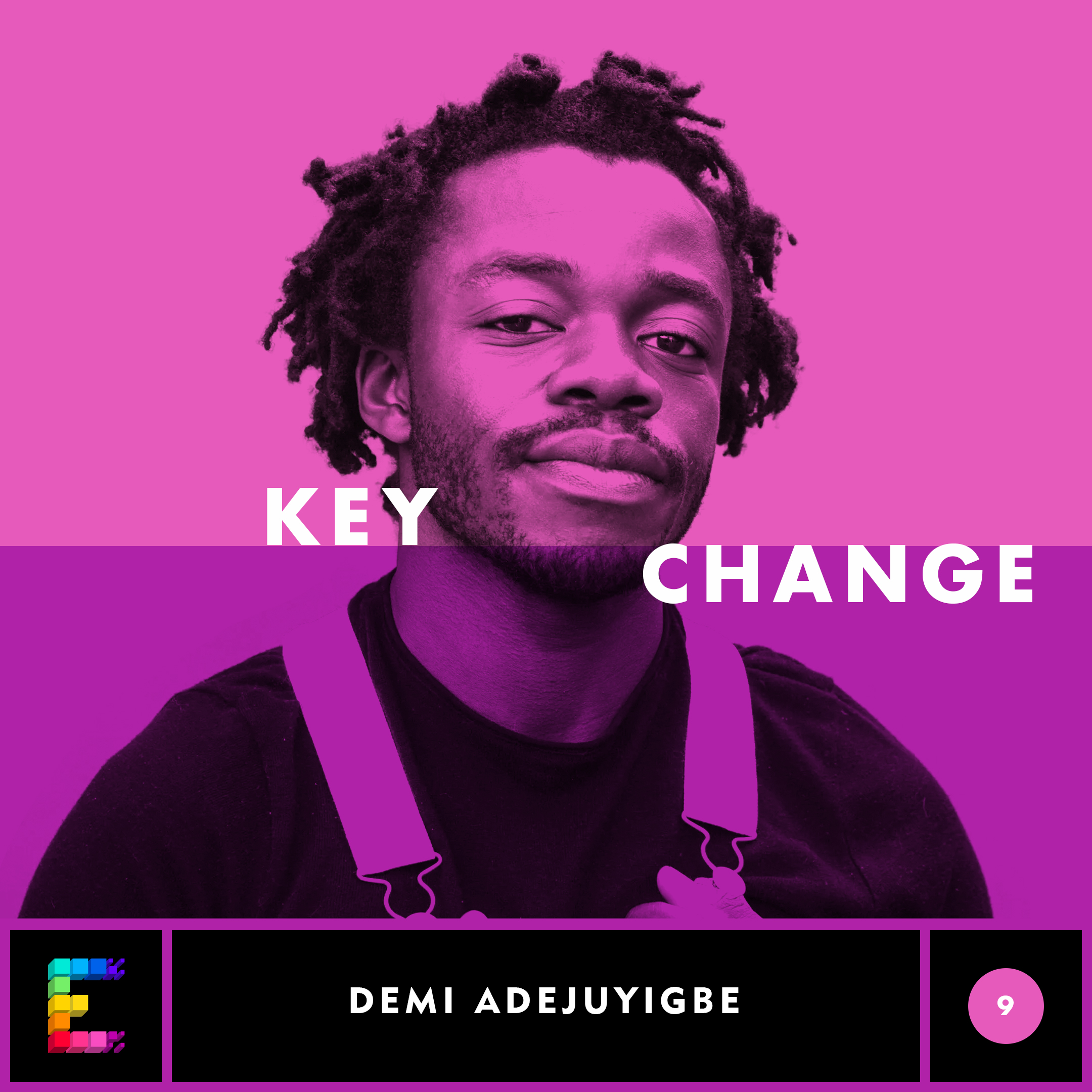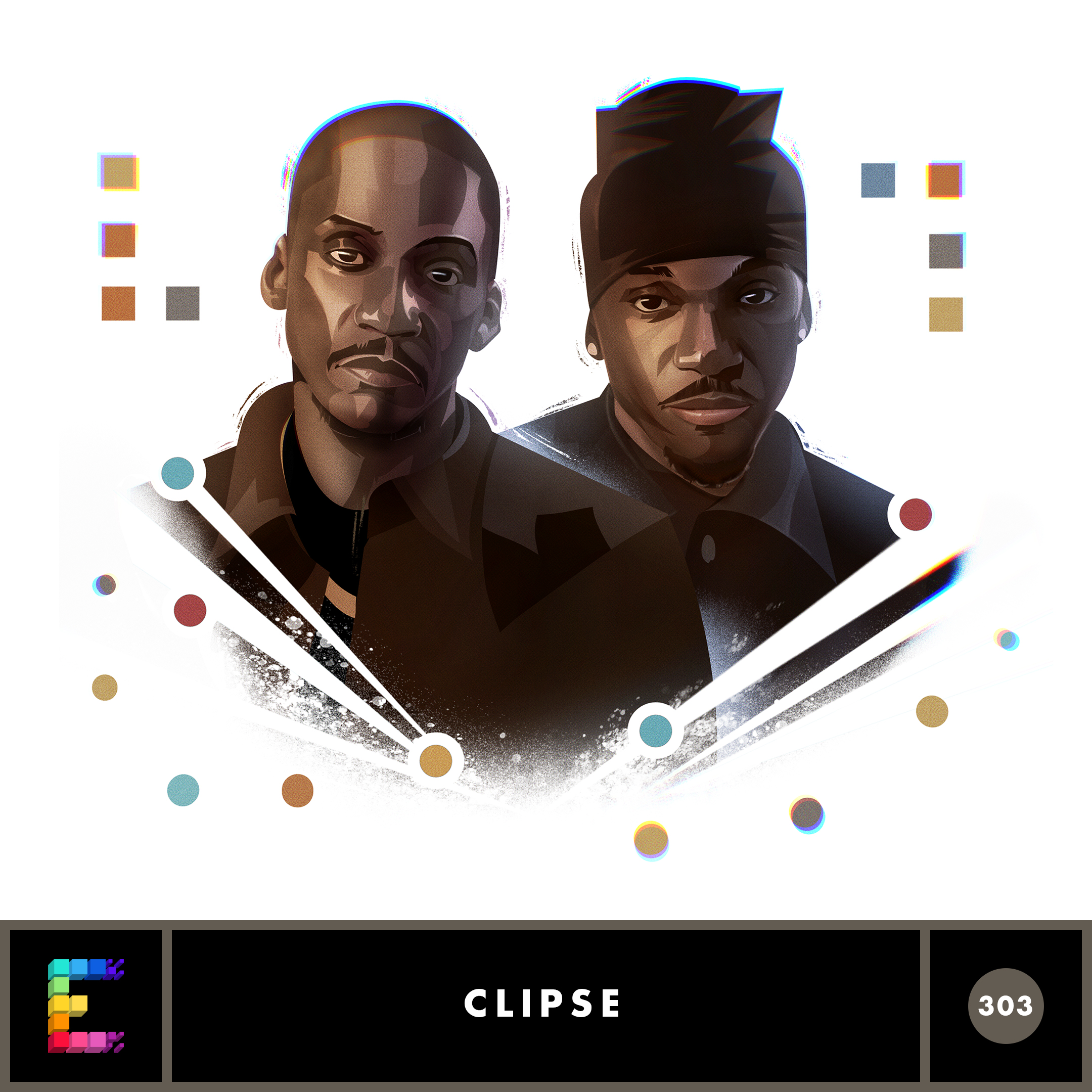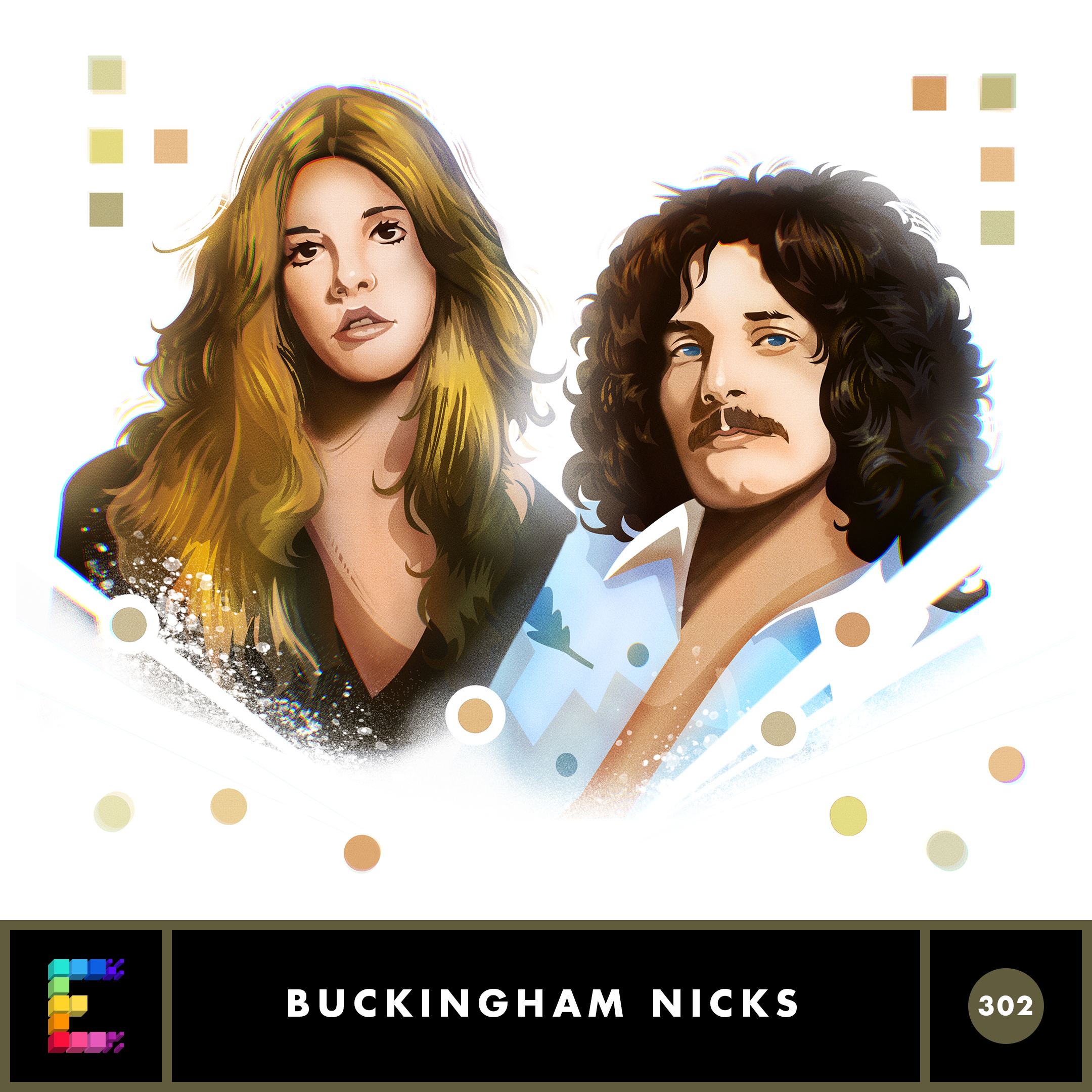A-ha - Take On Me
"Take On Me" by A-ha is an iconic hit of the 1980s. It came out in October 1985 with an equally iconic music video that helped define the age of MTV. It hit #1 in the US and in countries all over the world. And it's still massively popular today. It currently has over two and a half billion streams on Spotify. So, with all of that, it's easy to imagine that this was all inevitable. But actually, the song took so many steps and missteps before it became the hit that everybody knows. I talked to Paul Waaktaar-Savoy from A-ha, who wrote the original bones of the song back when he was a teenager in Norway, years before it came out. The song actually came out and flopped TWICE in the UK, before it found a foothold in the US. So for this episode, Paul took me through the whole history of the song, and all the different versions that existed. And he told me how he and his bandmates, Magne Furuholmen and Morten Harket, pushed and pushed and persevered. "Take On Me" was their first single as a band, and it made them the most successful Norwegian pop group of all time.
For more info, visit songexploder.net/a-ha.
Press play and read along
Transcript
Speaker 1 You're listening to Song Exploder, where musicians take apart their songs and piece by piece tell the story of how they were made. I'm Rishikesh Hirway.
Speaker 1 So I just wanted to say a couple words about how this show works. Song Exploder is part of Radiotopia, which is a group of independent podcasts.
Speaker 2 And if you look around these days, independence is becoming more and more rare.
Speaker 1 Everything from record labels to movies to newspapers, everything is getting consolidated and controlled by a small number of corporations.
Speaker 1 To me, one of the tragedies of this means you get less original, weird, unexpected, and creative stuff out in the world.
Speaker 1 And this podcast is all about celebrating the surprising ways that creativity gets manifested. That's really interesting to me, the way that actual people turn their experiences into art.
Speaker 1 And if you're listening to this, I hope that means it's interesting to you too. But in order to maintain this show and that philosophy, it takes a lot of hustling to keep things going.
Speaker 1 This spiel is part of the hustle, and I hope you'll forgive me for it. But Song Exploder and all the shows at Radiotopia need the support of listeners like you.
Speaker 1 It's the annual Radiotopia fundraiser right now, and we're looking for 1,500 new donors who believe in unique, independent media and the messiness of creativity, and more importantly, just love listening.
Speaker 1
If that's you, please consider making a tax-deductible donation at songexploder.net/slash donate. That's songexploder.net slash donate.
Thank you so much for making the show possible.
Speaker 1 I'm so glad to have Quince as a sponsor of the show because I'm leaving for a trip to the East Coast tomorrow and I already know that I'm going to be wearing a sweater that I got from Quince on the plane.
Speaker 1 In my head, I call it my airplane sweater because I always want something that's super cozy and comfortable, but I also want to look like, you know, a grown-up when I'm traveling.
Speaker 1 And Quince had a solution for me in the form of this cashmere waffle quarter button sweater.
Speaker 1 Plus, I love that they work with only factories that use safe, ethical, responsible manufacturing practices.
Speaker 1 So, whether or not you're getting on an airplane anytime soon, get your wardrobe sorted and your gift list handled with Quince.
Speaker 1
Don't wait, go to quince.com/slash song exploder for free shipping on your order and 365-day returns. It's now available in Canada too.
That's q-u-in-ce-e.com/slash song exploder.
Speaker 1 Free shipping and 365-day returns at quince.com/slash song exploder.
Speaker 1 when i was a kid the first song where i ever thought this is my favorite song was take on me by aha looking at it now it's like of course that was your favorite song it is an undeniable iconic hit of the 1980s it came out in october 1985 with an equally iconic music video that helped define the age of mtv
Speaker 1 it hit number one in the us and in countries all over the world and it's still massively popular today. It currently has over two and a half billion streams on Spotify.
Speaker 1 So with all of that, it's easy to imagine that this was all inevitable. But actually, the song took so many steps and missteps before it became the hit that everybody knows.
Speaker 1 I talked to Paul Wachter Savoy from AHA, who wrote the original bones of the song back when he was a teenager in Norway, years before it came out.
Speaker 1 The song actually came out and flopped twice in the UK before it found a foothold in the US.
Speaker 1 So for this episode, Paul took me through the whole history of the song and all all the different versions that existed.
Speaker 1 And he told me how he and his bandmates, Magna Verholman and Morton Harkett, pushed and pushed and persevered.
Speaker 1 Take On Me was their first single as a band, and it made them the most successful Norwegian pop group of all time.
Speaker 2 I am Paul Vocta Savoy, which is a mouthful. Aha has three members, Magna Fuhrer Holman, who plays keyboards, Morton Harket on lead voice, and myself, Paul Wakta Savoy, on guitar.
Speaker 1 You and Magna started playing music together years before AHA actually began, is that right?
Speaker 2 Yeah, he lived down the street from me when we were like 12 or something. So we've been in the band for a long time.
Speaker 2 We had made a pact at 15 or 14 that we were going to go to England and try to get a record deal. I mean, Norway back then was really...
Speaker 2 I think they played one hour of pop music a week on the radio. It was very limited exposure to anything.
Speaker 2 So we just knew that if we were going to try to get a career out of this, we had to leave Norway, even though no one had done that before. And it was sort of like a laughable thing to say.
Speaker 2 But we, you know, at the same time, we thought that would be an amazing adventure.
Speaker 1 And the two of you were in a band together in high school called Bridges?
Speaker 2
Yeah, we did two albums with Bridges. But Bridges was sort of very introverted.
Lots of songs that everybody said, oh, I have to hear it 20 times before I get it.
Speaker 2 And Bridges sort of disintegrated, which was me and Magni left.
Speaker 2 But I think as we got closer to going to England, we started to get the urge like, well, we gotta have some songs that really sort of you can get with the first couple of listens.
Speaker 2 So we were definitely feeling that, you know, we had to sort of make it a little bit easier on people, on the poor listener.
Speaker 2 We had a rehearsal space in a kindergarten up the road and it was done on a four track.
Speaker 2 The The verse came to me on acoustic guitar, as I always wrote on, and then taking that to Mangna and we sort of played it around, just the two of us. He came up with a keyboard riff.
Speaker 2 I play guitar, Magna play keyboards, I play bass, and there's Magna's neighbor there singing loud backing vocals and
Speaker 2 the breaches drummer. And I had a sort of a throwaway chorus.
Speaker 2
I almost hated it. It sort of went around itself in a four-bar loop and you couldn't get out of it.
And it's just sort of like annoying.
Speaker 1 That song was called Miss Erie, is that right?
Speaker 2 Yeah.
Speaker 1 Where did that name come from?
Speaker 2 That was, I mean, it's embarrassing, but I probably were inspired by like Aladdin Sane by Bowie, which is Alad Insane. So I wanted to do my misery, Miss Eerie.
Speaker 2 It's like one of those teenage overreach.
Speaker 1 And so how did Morton end up joining the band?
Speaker 2 Well, Morton first heard us when we played a show in his school, and he was a fan, one of our, maybe the only fan we had.
Speaker 2
So he was always interested in doing something with us. He just thought we needed a better vocalist.
So not me, in other words.
Speaker 2 You know, Morton had an amazing voice.
Speaker 2 Funny, first time I heard him, when we sort of auditioned him, he was playing in a blues band, and he just had a show the day before. So his voice was like
Speaker 2 so raspy, like a...
Speaker 2
Joe Cocker type of thing. It was like completely busted.
So I thought like, well, that's cool. Let's go for this guy.
Speaker 2 The next time I heard him,
Speaker 2 you know sang like an angel but he could do so much with his voice and that really changed my writing because before that i would be writing to my own voice so i had to be sort of limiting the octaves but with morten it's like writing for a totally different instrument so it was very inspiring And just from the get-go, he was such a fan of that song, especially the riff.
Speaker 2 He was just like, that was it.
Speaker 2 And then my parents had a little cabin outside of Oslo in the forest, so we borrowed that four-track recorder and try to come up with a demo tape that we can present when we go to England.
Speaker 1 Besides Morton joining the band, were there other ways that you were changing things up?
Speaker 2 Instead of guitars, we replaced it with the synth because that was really what was happening and we wanted to be part of the new sort of sound.
Speaker 2 So, the first version we did with Aha with Morton that was called lesson one.
Speaker 2 It was a totally new lyric and new approach.
Speaker 2 So, here's a lyric lesson nine number
Speaker 2 one.
Speaker 2 All
Speaker 1 You can still sort of hear the DNA of the original chorus that you said you didn't like in this chorus. Did you still also not like this one?
Speaker 2
It was like a sugar rush. It was too kind of bubbly and it didn't really give you goosebumps.
It was catchy, but it didn't really grab you in the way that I like a song to do.
Speaker 2 It has to have a more like a
Speaker 2 you got to feel that that sort of spine tingling.
Speaker 1 So this is October, November 1982?
Speaker 2 Yeah, I think so. Yeah.
Speaker 1 What happened next after you finished recording in the cabin?
Speaker 2
Then we decided, okay, that's it. Now we have eight songs.
We got a cassette. So now we can go to England and we can start doing the rounds, you know, with record companies and stuff like that.
Speaker 1 It's one thing to say we're going to move to England and start a music career there. But I'm just curious, how do you actually figure out how to move to England and even get started?
Speaker 2
We thought it would be a lot easier than it turned out to be, let's put it that way. We booked this sort of package tour.
Is that what you do?
Speaker 2 We didn't do the return flight. We just went to England because that was the cheapest we could get.
Speaker 2 And then it was like, okay, what do we do now? You know, so we knew nothing. We knew no one.
Speaker 2 We bought like a Melody Maker or Music Express.
Speaker 1 These are music magazines.
Speaker 2
Yeah, back in the day. They're probably gone now.
But, you know, there'll be some ads there there and stuff like that. But it was very hard to actually figure out how do we do this?
Speaker 2 How do we get through the reception at any record company? You know, you just can't, you know. It was very inspiring too, though.
Speaker 2 Coming to England, you could, for the first time in our life, suddenly you have pop music coming out of every shop, every cab, you know, it was just everywhere.
Speaker 2 going to places like Hampton Palace, which was like a really cool club.
Speaker 2 So you did sort of want to compete at that level. And it took us about two weeks to realize that demo sounded pretty thin
Speaker 2
and not really hip enough. So after about a few months, we did the last money we have and booked two or three days in this studio.
I think we recorded like four songs.
Speaker 2
Not Tech On Me, but four other songs. And as luck had it, the owner of that studio loved the demo, John Ratcliffe.
And he was signed to EMI and his A ⁇ R guy, Terry Slater,
Speaker 2 had quit EMI and he looked for a band to manage. So they became our managers.
Speaker 1 How did that change things for you guys?
Speaker 2 You know, for the next couple of years, we were able to use the downtime of that studio from four in the morning till the new session came in at 10 next day.
Speaker 2 So we'd be sitting around there like tired and ready to keel over waiting for that band to get finished and then hop in and use those hours to do a new song.
Speaker 2 They had a drum machine, and I'm terrible with every machine and every sort of software I ever made. But the Lindrum, I just took to it.
Speaker 2 So we would just sort of lay down the drums first, imagining what the rest of the track would be.
Speaker 1 Is this something that you made in John's studio then?
Speaker 2 Yeah, this is Rendezvous Studio, so A-track.
Speaker 2 And Magna had a, you know, I hear that.
Speaker 2 From there on in, that became really part of the groove.
Speaker 2 But you can see we're trying to figuring out what the bass is doing.
Speaker 2 And my bass drum patterns is sort of trying to find the right
Speaker 2 thing.
Speaker 2 The song is pretty much sketched out at that point,
Speaker 2 but the chorus was not happening.
Speaker 2
And then Terry said, he had worked a lot with Queen and all these different artists. And he would say like, well, whatever you got a falsetto, you had a hit.
Falsetto, you had a hit.
Speaker 2 That was one of his sayings. And I thought, well, hell, we got the best freaking falsetto singer right here.
Speaker 2 He can sing super low, he can sing super high.
Speaker 2 And where most people have, like, a sort of whispery, sort of weakish falsetto, he can't really do that. The way he does falsetto is like full-on,
Speaker 2
it's like a trumpet. But I don't really love when that sort of money notes coming straight, here comes the chorus, and everybody goes up.
And,
Speaker 2 you know, so I never really liked that kind of songwriting. So I thought, you know, Morton has a really nice register.
Speaker 2 So I thought, okay, maybe we should start it with the lowest notes and then bring it up to the falsetto where you can guarantee to get hit.
Speaker 2 And take on me, of course. That's the
Speaker 2 we're Norwegian and like people tell me, you can't say take on me. That's not real English.
Speaker 2
But it just felt like that song couldn't be called anything else. It just had to be, you know, take me on.
No, I don't like that.
Speaker 2 In in a way, we were trying to take on the world, and we were just saying, like, well, take on us, you know, get a lot of this.
Speaker 2 So, this is the first time we have a new chorus.
Speaker 1 My conversation with Paul Wachter Savoy of AHA continues after this.
Speaker 1 Song Exploder is sponsored by DistroKit. If you're an independent artist, DistroKid is a great way to get your music distributed.
Speaker 1 You get unlimited uploads and you get to keep 100% of your royalties and earnings.
Speaker 1 There are more than a million artists, including me, who have used DistroKid to get their music into all the major streaming services. Spotify, Apple Music, TikTok, everywhere.
Speaker 1
The DistroKid app is now available on iOS and Android. Go to the app or Play Store to download it now.
And for 10% off your first year's membership, go to distrokid.com slash VIP slash song exploder.
Speaker 1 I want to thank Function for sponsoring Song Exploder because I've gotten so much out of my Function Health membership.
Speaker 1 It's given me data about what's happening in my body, data that most people never get.
Speaker 1 Most importantly, by learning stuff like my vitamin D level is low and my zinc level is low, I was able to take steps to fix things.
Speaker 1 I had my first lab visit this summer, and now I'm getting ready to go in for my follow-up visit, which is also included in the annual membership.
Speaker 1 So if you're thinking about a gift for someone who you really care about, function is a great idea, and it shows them that their health matters to you.
Speaker 1
With their membership, they can understand their health and they can make informed decisions all year round. You can own your health for $365 a year.
That's just a dollar a day.
Speaker 1 So learn more and join using the Song Exploder link. Visit functionhealth.com slash song exploder or use the gift code songexploder25 for a $25 credit towards your membership.
Speaker 1
Okay, so you had written the song. You had recorded this eight-track demo.
What was your next step?
Speaker 2 Next for the song was to try to find a producer.
Speaker 2 We were signed to order in the US.
Speaker 2 Andrew Wickham was our A ⁇ R guy, and it was really his job to find suitable producers. And the producers was very, very hard to find.
Speaker 2 This was the 80s where the producers was like gods, but we didn't know one from the next, really.
Speaker 2 In the end, they managed to get Tony Mansfield. It was exciting, but it also a little bit tricky because we were used to working very fast.
Speaker 2 But he had gotten a fair light, which he loved, and everything had to go through the fairlight.
Speaker 1 Could you explain what a fair light is and why, when you work with it, everything had to take longer?
Speaker 2 It's really a sampler mixed with a track recorder. And he would take the parch that we sort of insisted on taking, but he would love to also kind of make his own parch.
Speaker 2 That's when we actually found the baseline for the verse.
Speaker 2
That was his thing. And then little replies on the chorus.
That was dormant, I suppose I can.
Speaker 2 Take
Speaker 2 me
Speaker 2 up.
Speaker 2 But on this mid-late, on this version, you would have all these kind of orchestra and bangs.
Speaker 2 I feel like the first time people got samples, that's what they did.
Speaker 2 And it ate up a lot of time.
Speaker 2
Five guys staring at a computer screen. I mean, everything takes a long time.
We would never use a computer before. So when we had seven songs instead of ten, the money was spent.
For the whole album.
Speaker 2 Yeah. And we were there on a tourist
Speaker 2
visa. So it was a lot of pressure on the whole thing, you know, recording the album and stuff like that.
It's sort of like, you felt like you were on this borrowed time and the budget was spent.
Speaker 2 You know, it was a very tense time.
Speaker 2 You know, we tried to get it going before they really threw us out when we signed the deal with Warner Brothers we ended up signing with the Warner in America but Warner in England they were also interested and I think they were always a little bit pissed off with that that we didn't go with the English company
Speaker 2 so for years we were sort of struggling with a little bit
Speaker 2 of them not feeling like they
Speaker 2 needed to do so much for us since we didn't sign with them. So when that first single came out, they threw out a few of the ugliest posters we've ever seen just around where we lived, and that was it.
Speaker 2 There was nothing
Speaker 2 in the English charge back then, maybe it is still like that, but it was like you had one or two weeks to get it onto the charts, so you needed to have something, a TV show, something,
Speaker 2 and we didn't have any of that, so you couldn't expect it to just take off like that.
Speaker 2 So, that is the first version that came out and bombed.
Speaker 1 Okay, so you have spent the whole budget, and then this version of the song comes out in 1984, and it flops. How were you able to convince anybody to give you another chance?
Speaker 1 Or maybe even more so, I'm curious, for your own sake, how were you able to feel like that wasn't the end of the road for the song? Like it had its chance, it didn't happen, and that was that?
Speaker 2
Yeah, that's the good thing about being young. You don't feel, you know, you just sort of brush it off your shoulders.
You know, we were 100% confident. We were like, there's not a doubt in our minds.
Speaker 2 So it must have been the A ⁇ R guy, Andrew Wickham. He must have felt the same thing.
Speaker 2 And the producer, Alan Tarney, who actually did the final version, he was almost saying yes before we went for Tony Mansfield.
Speaker 2 And I think Andy Wickham got back to him and say, this is what they ended up with, but I know it could be better. So he finally agreed to have another go.
Speaker 1 Alan Tarney. So this is how you end up with him as the producer.
Speaker 2
Yes. But it took some time.
You know, it was a very touching goal. Because, you know, they've spent this much money on the half-finished album.
Speaker 2 Are they going to pour more money into it and risk losing more money? So from Norway,
Speaker 2 no one comes from Norway and makes it. So it was a risk for people.
Speaker 2 But Alan Tarney had a little spot in between making this other album. So we could do five days.
Speaker 2 I remember the first day
Speaker 2 he
Speaker 2 had some sort of meeting or a doctor's appointment. So Magnet and I just put down a couple of parts just to sketch out the song.
Speaker 2 And already then it just sounded like wow this is so much cooler.
Speaker 2 So then it was my time to do the drum programming.
Speaker 2 At first we just had a basic pattern just like a straight pattern.
Speaker 2 He had a Lindrum, but what he did have is he didn't have a clap sound on that thing. He had two snares.
Speaker 2 So we ended up doing a halftime feel on the second snare.
Speaker 2 So you would have a...
Speaker 2
For me, it gave the whole song. what I've been missing.
That's sort of a little bit of a different swagger.
Speaker 1 Morton has all these little moves that he does in his vocals that are so awesome.
Speaker 1 One of my favorites is this little ramp-up that he does going into the chorus.
Speaker 2 Today is another day to find you shying away.
Speaker 2 This is just him just in the groove, and he's just sort of like egging yourself on, you know? Yeah.
Speaker 2 Oh, I'll be coming for your love, okay.
Speaker 2 It it feel like it was a good song to start with because we did feel
Speaker 2
everything was very unsettled around us. Are we going to be sent back to Norway? Are we going to lose this deal because we didn't finish the album? I've met my later wife.
She was American.
Speaker 2 I don't have a penny. How am I going to keep her without any? Everything was up for grabs.
Speaker 2 And you just sort of, yeah, you're sort of dreaming a big and hope that it comes come through.
Speaker 1 And that was what informed the lyrics to the song?
Speaker 2 Yeah, it's sort of like, it's not better to be safe than sorry.
Speaker 2 Already then, it was sort of like it's such a good vibe in the track.
Speaker 2 There must have been a song that I'd heard which used a PPG wave, which is that synthesizer. So I asked if we could possibly rent that in for the day
Speaker 2 so that was a very cool scent you know didn't make him too well so they always break down but back then it was brand new and the newest thing
Speaker 1 one thing i didn't know was in the song until i got these stems is the acoustic guitar yeah
Speaker 2
When we signed the deal with Warner, it took me to a guitar shop just to pick out a guitar. Being Norwegian, I was literally picked the cheapest one there.
It was like no bottom in it.
Speaker 2 You know, I read later that the guy from Smith, he just got him to buy like the most awesome vintage guitar. I should have gone that route, but yeah, I ended up with this kind of horrible
Speaker 2 thing,
Speaker 2 but you know, there's a reason for everything, it had a very sort of high trebly sound. So, whenever you kind of mix that in with all the drum feels, it became this sort of exciting thing.
Speaker 2 So, it worked out very well.
Speaker 2 So Tawny, Morton, and myself. It's got a three-part harmony.
Speaker 1
Wow, so the producer is also singing. Yeah.
So it'll be all three of you singing on one mic?
Speaker 2 Oh, yeah. One mic, you know.
Speaker 2 Take
Speaker 2 on
Speaker 2 me.
Speaker 2 Take on me.
Speaker 2 Take
Speaker 2 me,
Speaker 2 I'll be
Speaker 2 gone.
Speaker 2 I love the
Speaker 2 particular the last chorus because the two first choruses he goes to the falsetto at a sort of a later stage, but on the last one, he does the chest voice, and that's always like the big payoff for me.
Speaker 2 I'll be
Speaker 2 your
Speaker 1 After you finished recording this version, did the three of you feel differently than you had up until this point?
Speaker 2 Yeah, this time, when we mixed it with the house engineer there, Jerry Kitchingham,
Speaker 2 I just remember walking around there while he was mixing, hearing it through like a half-open door or down the hall or whatever.
Speaker 2 And I just feel like, God, if this isn't a hit, I don't know what is, you know, it was like, no matter in what sort of terrible situation you were in, it still sounded great.
Speaker 1 How much time passed between you finishing the song and then it finally coming out again?
Speaker 2 Well, that was the thing. I mean, we finished it very quickly in five days.
Speaker 2 And then the English WEA, which is sort of Warner in England, released it very quickly again
Speaker 2 and did the same kind of job as last time. There's no plan, there's no promotional thing.
Speaker 2 So it did the same business as the first time. You know, it just didn't do anything.
Speaker 2 And that's really when the people who signed us sort of stepped in and said, Okay, don't do anything more with this band. We want to launch it.
Speaker 2 So they kind of put the foot down and said, You don't do anything more on a huh.
Speaker 1 The American counterparts.
Speaker 2 And there was a new guy on the company, Jeff Airoff.
Speaker 2 He fell in love with the album and the song, and he had been keeping this one particular idea sort of in the back of his head. There was this art film called Commuter with animation.
Speaker 2
So he was the one who put together that with Steve Barron, who is the director. And made the music video.
Yeah.
Speaker 1 Do you remember the day it became clear to you that this version of the song released in America had become a hit?
Speaker 2
It was very strange because it climbed so slow. It was like they started at the bottom.
But of of course nobody's heard about the two first attempts.
Speaker 1 Right, because that was only in the UK. Yeah.
Speaker 2 But you know, as we get closer to the top, we would
Speaker 2 get our really our hopes up. And
Speaker 2 when it went into top 100, we were ecstatic. When it went into top 40, we couldn't believe it.
Speaker 2 Top 20, it was like, this is just amazing. I mean, we were on our high, you know.
Speaker 2 But of course, you didn't really expect it to go to number one. But then suddenly we got the call.
Speaker 2 I think we celebrated with a hamburger.
Speaker 1 You know, this song for me has been an enormous hit my entire life. But to know that it had all these different iterations,
Speaker 1 I don't know how much that exists anymore, of giving something that much of a chance.
Speaker 2 Yeah, I mean
Speaker 2 if you have something that you think it's uniquely itself, you never lose
Speaker 2 faith in it, that it could be something, you know, and
Speaker 2 so you chase it up and you give it its best shot, you know. But of course, when it comes to hits, you have to be a little bit lucky if you're in the right time, in the right spot.
Speaker 2 There's so many things against you, and it's very difficult.
Speaker 2 But it does help to be a little bit stubborn.
Speaker 1 And now, here is Take on Me by Aha in its entirety.
Speaker 1 Don't kick away.
Speaker 1 I don't know what
Speaker 1 to say or say it anyway.
Speaker 1 But today is another
Speaker 1 day to find you shy away.
Speaker 1 Off and come and we love okay.
Speaker 1 Day
Speaker 1 gone
Speaker 1 I'm all descended
Speaker 1 from me, still a little way.
Speaker 1 Slowly learning that life is okay.
Speaker 1 Say after me.
Speaker 1 It's not better to be safe and sorry.
Speaker 1 Take
Speaker 1 on
Speaker 1 me.
Speaker 1 Take
Speaker 1 me
Speaker 1 on.
Speaker 1 I'll be
Speaker 1 gone
Speaker 1 in a dirty.
Speaker 1 All the things that we say
Speaker 1 is in a lighthouse.
Speaker 1 Just a flame of memories away.
Speaker 1 You're all the things I've got to remember.
Speaker 1 Shy and away.
Speaker 1 Well, I'll be coming for you anyway.
Speaker 1 Take
Speaker 1 on
Speaker 1 me.
Speaker 1 Take on me, take
Speaker 1 me
Speaker 1 up
Speaker 1 Take on me,
Speaker 1 I'll be
Speaker 1 your
Speaker 1 take
Speaker 1 on me
Speaker 1 Take on me, take
Speaker 1 me
Speaker 1 up
Speaker 1 Take on me,
Speaker 1 I'll make
Speaker 1 you
Speaker 1 Visit songexploder.net to learn more. You can see some of the original pages from Paul's notebook in 1981 where they were working out the lyrics to the song as it evolved.
Speaker 1 You'll also find links to buy or stream Take On Me and you can watch that iconic music video.
Speaker 1 This episode was produced by me, Craig Ely, Mary Dolan, and Kathleen Smith with production assistance from Tiger Bisco.
Speaker 1 The episode artwork is by Carlos Lerma and I made the show's theme music and logo.
Speaker 1 Song Exploder is a proud member of Radiotopia from PRX, a network of independent, listener-supported, artist-owned podcasts. You can learn more about our shows at radiotopia.fm.
Speaker 1 If you'd like to hear more from me about what I'm watching and listening to and thinking about, you can subscribe to my newsletter, which you can find on the Song Exploder website.
Speaker 1 You can also get a Song Exploder shirt at songexploder.net/slash shirt.
Speaker 1 I'm Rishikesh Hirway. Thanks for listening.
Speaker 2 Radiotopia
Speaker 2 from PRX.
